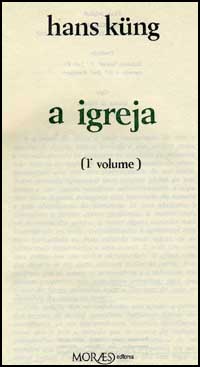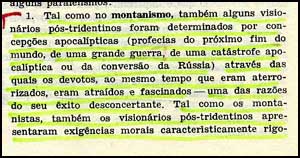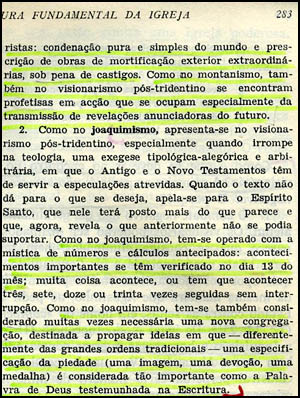In 1967, Hans Küng published his most important theological work, The Church. In writing this book, Küng received the "precious help" of Fr. Joseph Ratzinger, who with the author directed the Ecumenical Studies of Tübingen Catholic University. A due thank you from Küng to Ratzinger for this help is in the preface of the book.
The excerpt presented below is taken from a section where Küng is dealing with the role of the Holy Spirit in the structure of the Church. In it he analyzes specifically the role of "fanatic visionaries."
The text we highlighted is a violent criticism of the apparitions of Our Lady in Fatima, without mentioning the name. In the last paragrapah, he refers to a "new congregation" that was born to spread this marial devotion, which could be interpretated as the Blue Army, hatred by Progressivism.
At right is pictured the frontispice of The Church; at right below, photocopies of the Portuguese text. Below, we present our translation of the lines highlighted in yellow.
We want to note that we did not use the English version of this work because this translation waters down almost all of Küng's offensive remarks in order to make him more palatable to the reader.
As in Montanism [a 2nd-century heresy in which prophecy was a prominent feature], some post-Tridentine visionaries have been dominated by apocalyptic conceptions (prophecies of an imminent end of the world, a great war, an apocalyptic catastrophe, or the conversion of Russia), which causes in the devotees terror and, at the same time, attraction and fascination. This is one of the reasons for their astonishing success.
As in Montanism, the post-Tridentine visionaries have also presented characteristically rigorous moral demands: a pure and simple condemnation of the world, a call for extraordinary exterior mortification under penalty of chastisements.
As in Montanism, in post-Tridentine visions there are also prophetesses at work who are particularly concerned with transmitting revelations announcing the future.
As in Joachimism [Spiritual Friars in the late 13th-century who focused on apocylyptic prophecies], there are mystical numbers and anticipated dates: important events have taken place on the 13th day of the month ....
As in Joachimism, a new religious congregation is often considered necessary to spread the ideas according to which .... a specific work of piety (a statue, a devotion, a medal) is considered as important as the Word of God witnessed in Scripture.
(Hans Küng, A Igreja, Lisbon: Moraes Editora, 1969, vol 1, pp. 282-283).
|


 |
